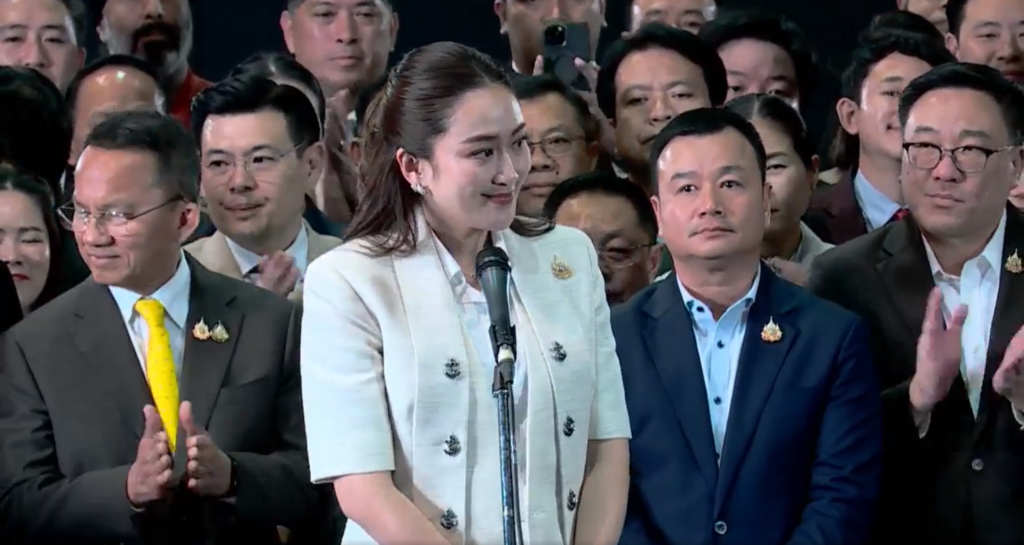Thailand’s Prime Minister Paetongtarn Shinawatra easily survived her first no-confidence vote in parliament, securing 319 out of 488 votes. The vote followed a two-day censure debate led by the opposition, targeting her inexperience, economic inaptitude, tax evasion claims, and strong ties to her father, former Prime Minister Thaksin Shinawatra.
Despite the criticism, the result reinforced the strength of Paetongtarn’s 11-party coalition, signaling political stability after years of unrest. At 38, Paetongtarn became Thailand’s youngest premier, stepping in after the court disqualified former PM Srettha Thavisin for an ethics violation. Critics questioned her qualifications, accusing her of being a puppet for Thaksin, who returned from 15 years in self-exile in 2023 and remains a polarizing figure in Thai politics. Though banned from office, Thaksin continues to comment on policy, claiming he only advises his daughter.
Paetongtarn, the fourth member of the Shinawatra family to lead the country, denied all allegations and urged the public to judge her on her work, not her lineage. She acknowledged both support and criticism as motivation to serve the people.
Thailand’s political landscape has long been divided, with past Pheu Thai-led governments frequently toppled by coups or court rulings. Still, this vote demonstrated that despite Paetongtarn’s lukewarm popularity and Thailand’s lagging economic performance, her government retains solid parliamentary backing.
Opposition leader Natthaphong Ruengpanyawut maintained that Paetongtarn lacked the necessary leadership qualities, warning of national setbacks under her rule. However, for now, the stability of her administration remains intact, signaling a potential shift in Thailand’s often volatile political scene.
This early win may provide Paetongtarn the breathing room needed to focus on economic reforms and strengthen her political legitimacy moving forward.



 Federal Judge Restores Funding for Gateway Rail Tunnel Project
Federal Judge Restores Funding for Gateway Rail Tunnel Project  Pentagon Ends Military Education Programs With Harvard University
Pentagon Ends Military Education Programs With Harvard University  U.S. to Begin Paying UN Dues as Financial Crisis Spurs Push for Reforms
U.S. to Begin Paying UN Dues as Financial Crisis Spurs Push for Reforms  U.S. Announces Additional $6 Million in Humanitarian Aid to Cuba Amid Oil Sanctions and Fuel Shortages
U.S. Announces Additional $6 Million in Humanitarian Aid to Cuba Amid Oil Sanctions and Fuel Shortages  Nighttime Shelling Causes Serious Damage in Russia’s Belgorod Region Near Ukraine Border
Nighttime Shelling Causes Serious Damage in Russia’s Belgorod Region Near Ukraine Border  Trump Endorses Japan’s Sanae Takaichi Ahead of Crucial Election Amid Market and China Tensions
Trump Endorses Japan’s Sanae Takaichi Ahead of Crucial Election Amid Market and China Tensions  U.S. Lawmakers to Review Unredacted Jeffrey Epstein DOJ Files Starting Monday
U.S. Lawmakers to Review Unredacted Jeffrey Epstein DOJ Files Starting Monday  Netanyahu to Meet Trump in Washington as Iran Nuclear Talks Intensify
Netanyahu to Meet Trump in Washington as Iran Nuclear Talks Intensify  China Warns US Arms Sales to Taiwan Could Disrupt Trump’s Planned Visit
China Warns US Arms Sales to Taiwan Could Disrupt Trump’s Planned Visit  Missouri Judge Dismisses Lawsuit Challenging Starbucks’ Diversity and Inclusion Policies
Missouri Judge Dismisses Lawsuit Challenging Starbucks’ Diversity and Inclusion Policies  Trump Backs Nexstar–Tegna Merger Amid Shifting U.S. Media Landscape
Trump Backs Nexstar–Tegna Merger Amid Shifting U.S. Media Landscape  Trump Says “Very Good Talks” Underway on Russia-Ukraine War as Peace Efforts Continue
Trump Says “Very Good Talks” Underway on Russia-Ukraine War as Peace Efforts Continue  Norway Opens Corruption Probe Into Former PM and Nobel Committee Chair Thorbjoern Jagland Over Epstein Links
Norway Opens Corruption Probe Into Former PM and Nobel Committee Chair Thorbjoern Jagland Over Epstein Links  New York Legalizes Medical Aid in Dying for Terminally Ill Patients
New York Legalizes Medical Aid in Dying for Terminally Ill Patients  US Pushes Ukraine-Russia Peace Talks Before Summer Amid Escalating Attacks
US Pushes Ukraine-Russia Peace Talks Before Summer Amid Escalating Attacks  Trump’s Inflation Claims Clash With Voters’ Cost-of-Living Reality
Trump’s Inflation Claims Clash With Voters’ Cost-of-Living Reality 































